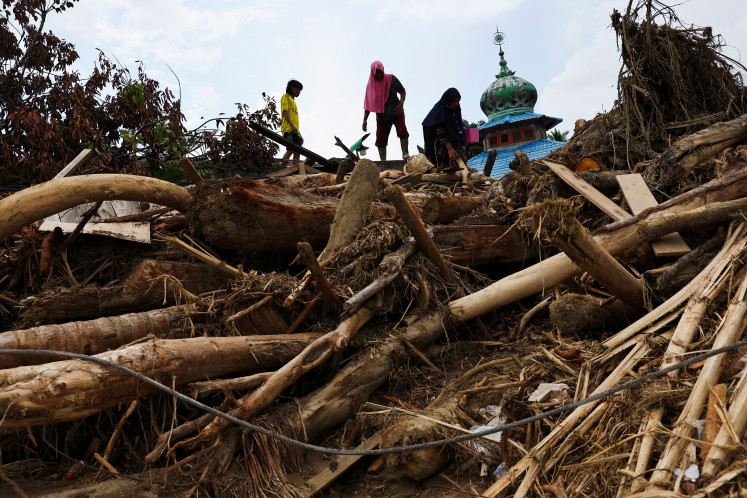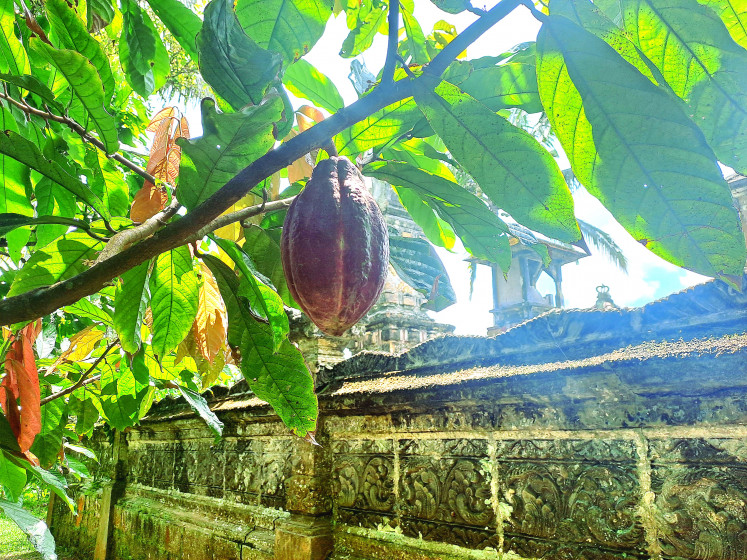Popular Reads
Top Results
Can't find what you're looking for?
View all search resultsPopular Reads
Top Results
Can't find what you're looking for?
View all search resultsIndonesia’s foreign policy: Lack of interest or mere prioritizing
Retno Lestari Priansari Marsudi - JPWhile President Joko “Jokowi” Widodo’s decision to push for economic and structural reforms in the domestic sphere may start to pay off, the international community likely won’t hold its breath for Indonesia to take a prominent spot among the influential on the global stage
Change text size
Gift Premium Articles
to Anyone
Retno Lestari Priansari Marsudi - JP
While President Joko “Jokowi” Widodo’s decision to push for economic and structural reforms in the domestic sphere may start to pay off, the international community likely won’t hold its breath for Indonesia to take a prominent spot among the influential on the global stage.
Critics have been particularly quick to point out his seeming lack of interest in foreign policy as a gaping hole in an otherwise laudable national development agenda.
“I think President Jokowi does have a rather narrow economic development agenda and does not consider foreign policy to be a critical component of that agenda,” said Evan Laksamana, a researcher with the Centre for Strategic and International Studies (CSIS).
“Aside from pragmatic considerations of bringing foreign investment and providing infrastructure loans, the nuances of broader regional affairs and global politics, I think, are just not in the President’s heart and mind.”
Indonesian foreign policy has largely been informed by the priorities Jokowi set out for his Cabinet in accordance with his Nawacita mission statement, which Foreign Minister Retno Lestari Priansari Marsudi first translated into foreign policy priorities during an annual statement to the press in January 2015.
At the time, she said Indonesia would focus on three foreign policy objectives for the next five years: maintaining Indonesia’s sovereignty, enhancing the protection of Indonesian citizens and entities abroad and the mainstreaming of the “economic diplomacy” cluster.
And while the emphasis on each of the priority areas is in line with Jokowi’s inward-looking realpolitik, it also showcased the former Jakarta governor’s lack of enthusiasm toward international affairs.
The President, who in the beginning was an unknown presence on the global stage, did make an effort to attend global events, if only to flaunt his business savvy and promote Indonesia.
But even in his international engagements, one could presume that Jokowi preferred to attend events that were economically beneficial to Indonesia.
For the 2015 ASEAN Summit in Malaysia, his first high-level ASEAN engagement, Jokowi attended the opening processions but delegated the crucial retreat session — where leaders could talk openly about the region’s strategic issues — to Vice President Jusuf Kalla.
Earlier this year, Jokowi also failed to attend the Paris Climate Agreement signing ceremony at a time when Indonesia was making ambitious promises about lowering carbon emissions.
Environment and Forestry Minister Siti Nurbaya Bakar signed the agreement while Jokowi was in Europe to push through the Indonesia-European Union Comprehensive Economic Partnership (CEPA).
Jokowi’s absence was even more glaring when he skipped the United Nations General Assembly (UNGA) for two years in a row, despite Indonesia’s aspiration to obtain a non-permanent seat on the UN Security Council (UNSC) for the 2019 to 2020 period. Kalla kicked off in September Indonesia’s campaign bid in New York in his place.
It was becoming more obvious that the former furniture businessman had effectively sidestepped the whole foreign policy debate altogether, choosing instead to delegate the task without much guidance apart from his nine key programs, Nawacita, and the global maritime fulcrum plan.
This was quickly rectified by his aides when the list of foreign policy priorities in 2016 grew to include “advancing Indonesia’s regional and international role,” with Retno swooping in to say that Indonesian foreign policy “was actively at work”.
Retno also noted that Jokowi attended more than 64 bilateral and international meetings throughout 2015, sharing his responsibilities with Vice President Jusuf Kalla, who attended 22 other bilateral meetings, Deputy Foreign Minister AM Fachir (46 meetings) and Retno herself (155 meetings).
While the President may get away with such a narrow vision in his maiden year in office, there is an urgent need for him to take over the reins from Retno.
Dino Patti Djalal, former deputy foreign minister and founder of the Indonesian Foreign Policy Community (FPCI), said Jokowi had stepped up his international engagement in his second year, but warned that he would need to take the lead on key issues and ensure his aides were all on the same page.
“This is critical for Indonesia’s credibility, which is the source of our leadership,” Dino argued.
Meanwhile, Siswo Pramono, who heads the Foreign Ministry’s Policy Analysis and Development Agency (BPPK), defended Jokowi’s emphasis on domestic development as that influenced the country’s foreign policies.
The aggressive promotion of Indonesia’s trade and investment potential overseas hinges on the need to shift its portfolio from a commodity-dependent economy to one more diversified and independent, he argued.
“Before we can start listing the ABCs of foreign policy, there needs to be realization that we need to improve our economic standing to enhance our level of competitiveness,” Siswo said on Thursday. (sha)










